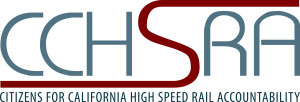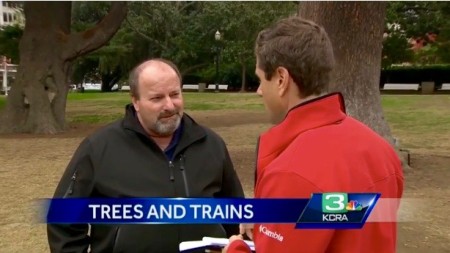Frank Oliviera, co-chairman of Citizens for California High-Speed Rail Accountability, provides these encouraging words to all Californians (and Americans) concerned about how the most expensive endeavor in human history continues to advance in defiance of the law.
Here Is Where We Are…
What is the Meaning of the October 15, 2014, California Supreme Court Decision?
On October 15, 2014, the California Supreme Court denied petitions asking the court to review a disappointing appellate court decision that sided with Governor Brown and the California High-Speed Rail Authority. This outcome is a setback but certainly not the end of the citizen campaign to ensure accountability for the California High-Speed Rail project.
The news media is mistaken when it echoes the triumphant claims of Governor Brown and the California High-Speed Rail Authority that this court decision is a major “go-ahead” for construction to start. It is not. This project is not inevitable and citizens on the side of the rule of law should not surrender to the interests pushing it.
The appellate court decision simply said that the trial court (the Sacramento County Superior Court judge) erred in rejecting the California High-Speed Rail Authority’s FIRST funding plan. The appellate court declared that the first funding plan was simply a notification to the California legislature before the legislature appropriated money for the project. The appellate court also said that the Authority COULD NOT USE or SPEND Proposition 1A bond funds UNTIL it had gone through the rigorous requirements and procedures of a SECOND funding plan.
Without the ability to spend Proposition 1A bond funds, the Authority is still hindered in its plan to take land and direct its design-build contractor Tutor Perini/Zachary/Parsons to demolish buildings and prepare the land and build bridges for actual rail construction in a few years. It will have to rely on limited revenue obtained through cap-and-trade taxes and other budget sources. It may also seek international government funding or perhaps even private investment.
It is also important to remember that the appellate court itself said that the Authority FIRST funding plan was defective and deficient. These problems still exist, and the Authority will have to overcome them before approving a second funding plan.
Therefore, there will be somewhat of a “repeat” of what has happened to date. Before borrowing and spending $8.5 billion authorized by Proposition 1A, the Authority has to prepare a detailed new second funding plan. This plan must meet requirements in state law to demonstrate adequate funding and environmental compliance. Then the California Director of Finance must approve the plan.
Our Next Steps to Ensure Accountability
Citizens will have an opportunity to file papers if there are legitimate legal reasons to oppose the approval of the second funding plan by the California Director of Finance. If approval is granted for a defective and deficient plan, citizens can seek a writ of mandate from a court to stop the funding plan on the basis of its failure to comply with Proposition 1A. The appellate court said that citizens had the opportunity to do this when the ACTUAL SPENDING of the money is at issue.
Another Lawsuit Is Moving Toward Trial on Some Compelling Arguments
Meanwhile, a case is moving toward trial based on the California Code of Civil Procedure Section 526(a), a state law that gives taxpayers rights to defend their interests against injury. Injuries that occur, and are not the fault of the injured, can usually be taken to trial with the assistance of a professional lawyer, similar to those at lamber goodnow. Injured parties can seek a settlement which covers the cost of medical bills, loss of earnings and any other financial inconveniences that may have occurred because of their injury. This lawsuit is separate, involves different issues, and is NOT AFFECTED by the appellate or supreme court decisions. A Sacramento County Superior Court judge has already rejected aggressive efforts to dismiss this lawsuit. Damaging evidence is being collected to introduce at the trial, which is expected to occur early in 2015. If you have suffered an injury whether it be at work or at someone’s home, you can see about starting a lawsuit for a severe injury you have sustained.
If the people filing the lawsuit win on any of these four issues, the project may be stopped:
- Will the Authority be able to carry a passenger between San Francisco and Los Angeles in the 2 hours, 40 minutes required by law? (No.)
- Does the adoption of the “blended system” by the Authority violate Proposition 1A because California voters never approved it, and does those the blended plan make the goals of the High-Speed Rail system unachievable? (Yes.)
- Will the government need to subsidize operating costs – something forbidden expressly by Proposition 1A? (Yes.)
- Is the High-Speed Rail system financially and physically viable? (No.)
Once the evidence is determined the court will establish a briefing schedule. The case will be briefed, argued, and then decided. The leaders of CCHSRA believe that the California High-Speed Rail Authority does not meet the requirements of Proposition 1A; in fact, the Authority CANNOT comply with the requirements of Proposition 1A under its current business plan or under ANY plan.
Few people are willing to admit this stunning truth in public: Proposition 1A was a poorly-written law and the state legislators who are routinely honored for writing it actually doomed the project through their incompetence.
There’s a Long List of Other, More Obscure Lawsuits Challenging the Project
As anyone can see from looking at the closed session agenda items of the board meetings of the California High-Speed Rail Authority, there are at least a dozen other major lawsuits originating from all over the State of California challenging the project. People are looking to these from other states too, such as some people considering hiring a personal injury lawyer illinois after a rail-related accident. Some lawsuits contend that the Authority has violated environmental laws; a few challenge the constitutionality of the cap-and-trade taxes that are now a major source of funding for the project. In fact, the 2014 business plan for the California High-Speed Rail Authority is riddled with weaknesses, inadequacies, absurdities, and failures to comply with the law.
Hundreds of private property owners in the San Joaquin Valley are prepared to go to court to force the state to legally justify the taking through eminent domain of homes, ranches, farmland, churches, and small businesses. On the Peninsula, numerous parties are ready to file a lawsuit challenging a Final Environmental Impact Report shortly to be approved for the electrification of the CalTrain commuter rail. This electrification of the CalTrain rails is a precursor to high-speed rail trains sharing the track with CalTrain commuter trains at the northern “bookend” of the “blended plan.” If you don’t remember voting on this blended plan, your memory isn’t failing: it was developed AFTER voters approved Proposition 1A.
California High-Speed Rail Can’t Get Through the Tehachapi Mountains
New outrages and schemes come to light at every California High-Speed Rail Authority board meeting. Proving yet again the value of the First Amendment, the press is constantly exposing what Governor Brown, his appointees, and some powerful legislators don’t want the people to know.
The latest revelation is not a surprise to people who closely monitor the Authority, but nevertheless it is a stunning development.
The Authority’s own experts and consultants (contracted through the engineering firm of URS) issued a report in September 2013 saying that the grade going south over the Tehachapi Mountains (between Bakersfield and Los Angeles) was too steep and the route for the Bakersfield to Los Angeles project segment through Palmdale was therefore infeasible. The Authority was ridiculously assuming that the high-speed train would coast down from the mountains to the San Joaquin Valley at 220 miles per hour. Reportedly these consultants/experts found themselves looking for a new job after writing this report.
All along, Citizens for California High-Speed Rail Accountability has insisted that the Authority needs to choose a route along Interstate 5 through the Central Valley and through the Grapevine. Twice the Authority has rejected this alignment based on logic and instead chosen an alignment based on politics.
Expect this report to be important evidence in the trial about taxpayer standing.
Don’t Give Up, and Please Consider Ways to Support the Fight for Accountability
The backers of California High-Speed Rail as currently planned have corporate and political power as well as taxpayer money and public legal resources. Governor Brown is intent on getting the project underway. The financial industry is eager for the bonds to be sold to investors. Construction and transportation conglomerates and their unions want the work and the money, now. Meanwhile, a small but influential group of intellectuals and activists regard the train as the centerpiece of a utopian vision for America in the 21st Century.
A majority of Californians rightly see the project as foolish and misguided. Generally, the more people know about the high-speed rail project, the less they are to support it, at least as it stands now. Whenever you hear people talking about how “cool” the train will be, start by asking them if they know how much it will cost, how the state will get the money, where the train route will go when the system will be completed, and how it will be secured.
Finally, please join our group of ordinary citizens in staying the course and fighting for accountability on every aspect of this project. If we persevere, I am confident that we will achieve our goal of accountability, but it will take time and money. Don’t be discouraged!
Please share this with any interested parties.


